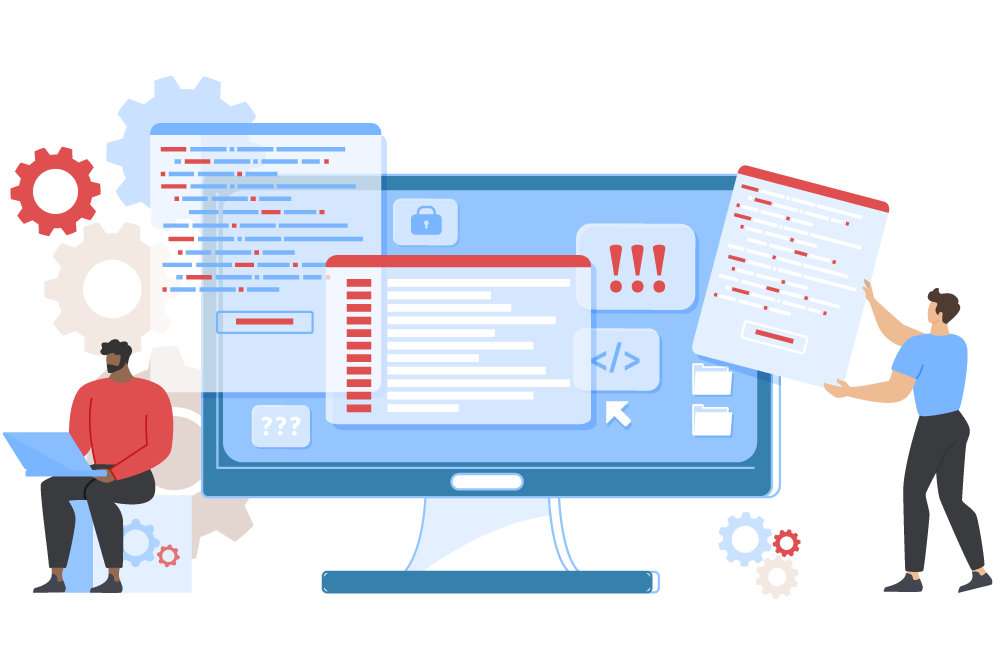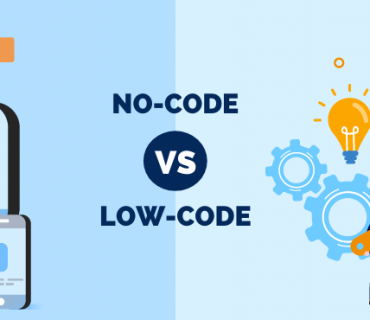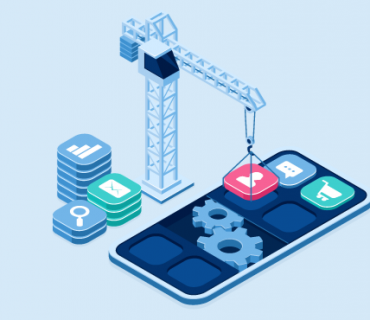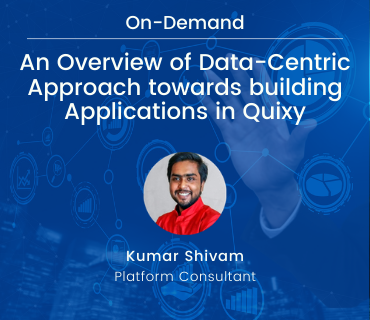Low-Code No-Code Development (LCNC)
Rethink, Reinvent & Transform your business with groundbreaking innovation of Low-Code No-Code.

What is Low-Code No-Code?
Low-code No-code is a visual and hassle-free approach to software development. Basically, creating enterprise-level applications using visuals and basic skills without proficient programming knowledge or skills.
Low-code no-code abstracts, automates and optimizes every step of a process and enables rapid delivery of any software solution. It disrupts the traditional ways of business and IT to nurture and boost continuous collaboration.
Low-code platforms can cut enterprise app development time by as much as 60%.
Low-Code
Low-code is the shortened term for low-code platforms which are application development platforms that offer the user the ability to build applications with existing elements while being able to integrate code into them.
While no-code and low-code are often referenced together, they have a clear demarcation in terms of the technical understanding required to operate the different platforms. These platforms may not be accessible to total beginners but are good for those who have a technical mindset in business backgrounds.
No-Code
No-code, shortened from no-code platforms refers to application development platforms that require zero coding! This means applications can be built on purely visual, intuitive interfaces with no need for programming experience. These platforms often offer features that are simple such as drag and drop form builders.
They work the same way you get to design a collage with stickers, simply take what you need and put it where you need it most. These are typically used by citizen developers or business users to build applications without having to write any code or depend on software developers for any help.
Frequently asked questions about LCNC
What is a low-code no-code platform?
A low-code platform is a platform that helps develop and deploy applications easily using visual tools such as drag-and-drop and a graphical user interface- that too without proficient coding knowledge.
A low-code no-code platform provides a base to create apps that automate every step of a process and enable the rapid delivery of any software solution. It disrupts the traditional ways of business and IT to nurture and boost continuous collaboration.
No-code platforms are built for citizen developers who may not know, nor do they need to know, any actual programming languages to use the product. The greatest pro of no-code platforms is that they require no prior coding knowledge, so anybody can quickly create business applications.
What are the benefits of low-code no-code?
- Anyone can build: The biggest and most significant benefit is the fact that just about anyone can develop low-code no-code apps now! You don’t need technical experience or knowledge about code and can deploy them within the span of a few hours!
- Intelligent Spends: Low-code no-code replaces all IT and professional costs and saves all the overhead costs. Moreover, because it is fast, it saves man-hours and that translates to saved revenue in the long run.
- Excellent agility: Low-code no-code development delivers excellent agility by automating everything from building to testing. The teams will, thus, have more time to actually get the work done instead of wasting it preparing for work!
- Enrich & Relish Innovation: Low-code and no-code development ease IT’s burden and gives citizen developers the power to create their own apps encouraging creativity with innovation!
- Incredible productivity: Low-code no-code has the ability to shoot up your business’ productivity and efficiency because it streamlines most tasks, notifies you of bottlenecks (and removes them), and reduces steps that are hindering the process and/or are unnecessary.
What are the features of low-code no-code?
- User Interface builder: One can build an entire web page with just one function: drag and drop. Everything from the header to the footer, the form, tables, and images can be assembled within minutes.
- Workflow Management: Workflow modelling is not just fast; it is also delightful. It lets you manage all your data seamlessly without ever indulging in the language of code.
- Seamless Integration & easily customizable: Low-code no-code platforms provide the ability to seamlessly integrate with any third-party applications and customize to suit your needs, with little to no coding.
- Speed: With low-code no-code, you can build apps for multiple platforms simultaneously within the span of hours and show stakeholders working examples.
- Rapid deployment: With low-code no-code, pre-deployment impact assessments make sure the apps work as they were intended to. Even if there are any unexpected events, you can roll back changes with a single click.
What is the difference between low-code and no-code?
Low-code development is a way for developers to develop applications quickly and with minimum hand-coding.
No-code apps are made by and for citizen developers who do not necessarily know, or need to know, any actual programming languages to create apps.
While no-code platforms are more suited for business users and citizen developers since the use of the platform does not require any coding, the low-code platforms are suited for power users (business users with technical skills) and professional developers.
What can you build with Low-Code No-Code?
No-code low-code platforms are near magical. They offer endless possibilities to build any kind of applications based on business needs. All businesses need is an idea and with the right platform to implement it in minutes and hours. Some of these applications include:
- Customer Relationship Management (CRM)
- Project and Task Management
- Help Desk Management
- Travel and Expense Management
- Human Resource Management System (HRMS)
- Employee Self Service
- Asset Management
- Procurement
The right low-code no-code platforms support the entire application development life-cycle, right from ideation to deployment and maintenance. Low-code no-code helps enterprises redefine the impact, speed, and delivery of enterprise solutions with a high focus on the functionality, logic, and end-user experience!
Who is a citizen developer?
A citizen developer is a non-professional developer who builds applications for use by other people. Although they do not report directly to IT, they use tools such as low-code platforms that are sanctioned by IT.
How do I become a citizen developer?
Becoming a citizen developer is not as daunting as it sounds because it requires no coding knowledge! All you need to do is find the right no-code platform that allows you to experiment with ideas to create effective solutions.
Quixy is helping citizen developers across verticals build applications in days and weeks to automate their manual processes and drive efficiency, productivity, and transparency.
Is low-code no-code only for large enterprises?
This is the biggest myths.
Low-code and no-code apps are currently being used for complex and small-scale enterprise applications in organizations across the globe. While traditional no-code platforms are ideal for simple departmental applications, there are advanced no-code platforms like Quixy that facilitate business users to build complex enterprise-grade applications.
Low-code can be used to build even more complex applications, however, these platforms require technical skills to do so.
What can industries do with low-code no-code?
Low-code no-code apps are helpful for businesses of all sizes and in many different trades, as well as for individual professionals.
- In Manufacturing, processes can be speeded in diverse areas including inventory management, equipment inspection, safety audits, and many more.
- For Energy and Utilities, no-code low-code platforms are a real game-changer as they allow the creation of important customer-facing apps that can fuel sales and customer engagement.
- In Supply Chain & Logistics, teams can use no-code low-code apps to handle supply chain visibility, procurement management, reporting, warranty management, and logistics.
- In Services, teams can use no-code low-code apps to automate workflows related to service delivery e.g. case management for a financial or an insurance institution, customer management, contract management, reporting, billing and invoicing etc.
What can different departments in a business do with low-code no-code?
- Accounting and Finance benefit from automatic reporting, profit and expense analysis, investment tracking, accounts receivable collection, payroll and invoice reporting, among others.
- HR and Administration can use no-code apps for employee onboarding, training, performance reviews, leave and payroll management, travel, and expense management.
- Marketing and Sales teams can streamline their campaign creation and distribution besides using no-code apps for lead management, customer relationship management, etc.
- Procurement can easily be accelerated with automating crucial processes like inventory management, consolidating all data in one place, and optimizing processes.
- Legal departments have a big advantage by going paperless and enabling forms automation, clientele records with real-time data and fast approvals.
Low-Code No-Code Blogs
Learn about Low-Code No-Code - Infographics
On-Demand Low-Code No-Code Webinars
How can different job functions benefit from Low-Code No-Code?
How can different industries benefit from Low-Code No-Code?
BPM eBook

Key Takeaways
- Reduce expenses
- Finish projects faster
- Reduce fails and clear backlogs




















